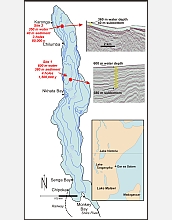News Release 07-114
Change from Arid to Wet Climate in Africa Altered Early Human Evolution

A bathymetric map of Africa's Lake Malawi shows locations of drilling sites and bottom profiles.
September 6, 2007
This material is available primarily for archival purposes. Telephone numbers or other contact information may be out of date; please see current contact information at media contacts.
A drastic change in the climate of tropical Africa may have significantly driven early human evolution, an international team of scientists has found.
The results are published online this week in the journal Proceedings of the National Academy of Sciences. Among the findings is that a transition from a time period with extreme droughts (135,000 to 75,000 years ago) to a stable, wetter climate may have stimulated the expansion and migration of early human populations.
The findings are part of a project called the Lake Malawi Drilling Project, funded by the National Science Foundation (NSF). Lake Malawi is located at the southern end of East Africa's Rift Valley, and is the third largest lake in the Southern Hemisphere.
"The sediment cores from Lake Malawi are the longest continuous record of climate change available from the continental tropics," says Paul Filmer, program director in the National Science Foundation (NSF)'s Division of Earth Sciences, which funded the research. "The link between the signals of East African moisture levels in core samples from the lake and a critical stage in human evolution is an important discovery."
The researchers studied lake cores from Lake Malawi and found that megadroughts characterized some of tropical Africa's driest periods over the last million years or more.
During the most severe episodes, the lake was below 15 percent of its current level--only 100 meters deep rather than 700 meters. Before about 70,000 years ago, the climate was highly variable, African lakes dried up completely and then refilled, and plant and animal populations grew and died out.
Then around 70,000 years ago, the climate became wetter and stabilized, and African lake levels rose dramatically, the researchers found. Human populations grew rapidly and migrated at that time.
"The population expansion and subsequent spreading of 'Out of Africa' human colonizers may have been aided by the newly stabilized climate," says scientist Christopher Scholz of New York's Syracuse University and lead investigator on the project.
The findings from the Lake Malawi Drilling Project and other similar lake drilling projects in the tropics "are likely to make major changes in our understanding of the Earth's climate history and its effects on our planet's ecosystems," says Andrew Cohen, a research team member at the University of Arizona. "This study shows what a rich record of climate change is in deep and ancient lakes like Malawi."
The team includes researchers from Syracuse University, the University of Minnesota-Duluth, the University of Arizona, the University of Rhode Island, the University of Akron, the University of Bergen (Norway), the Malawi Geological Survey Department, the Geological Survey Department of Ghana, the University of Illinois-Chicago, the Scottish Universities Environmental Research Centre and the University of Wisconsin-Eau Claire.
-NSF-
Media Contacts
Cheryl Dybas, NSF, (703) 292-7734, email: cdybas@nsf.gov
Kelly Homan Rodoski, Syracuse University, (315) 443-3784, email: kahoman@syr.edu
Related Websites
Lake Malawi Drilling Project: http://malawidrilling.syr.edu/
The U.S. National Science Foundation propels the nation forward by advancing fundamental research in all fields of science and engineering. NSF supports research and people by providing facilities, instruments and funding to support their ingenuity and sustain the U.S. as a global leader in research and innovation. With a fiscal year 2023 budget of $9.5 billion, NSF funds reach all 50 states through grants to nearly 2,000 colleges, universities and institutions. Each year, NSF receives more than 40,000 competitive proposals and makes about 11,000 new awards. Those awards include support for cooperative research with industry, Arctic and Antarctic research and operations, and U.S. participation in international scientific efforts.
Connect with us online
NSF website: nsf.gov
NSF News: nsf.gov/news
For News Media: nsf.gov/news/newsroom
Statistics: nsf.gov/statistics/
Awards database: nsf.gov/awardsearch/
Follow us on social
Twitter: twitter.com/NSF
Facebook: facebook.com/US.NSF
Instagram: instagram.com/nsfgov
